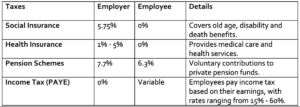Navigating the complex labour laws governing employment practices is essential when running Ivory Coast payroll. However, building an in-house compliance team may not be the most efficient way to manage your remote team’s payroll in Ivory Coast.
Regardless of size, global companies need help to secure in-country expertise for localised payroll service. This is where a partner like Workforce Africa provides significant value in supporting global firms to maintain compliance when handling payroll in Ivory Coast, addressing every intricate detail, including;
- Salary computation requirements,
- Taxation legislation specifics (social security, employee income tax, corporate tax, VAT and other employee deductions.
- Benefits administration, and more (health insurance, pension, paid leaves, holiday compensation.
Workforce Africa simplifies hiring and payroll compliance for offshore talent management in Ivory Coast. No need for a subsidiary or entity setup. From contracts and onboarding to taxes, payroll, and admin tasks, partnering with us – a payroll firm in Ivory Coast will help you focus on growth for greater levels of success.
Ivory Coast Country Overview
The Republic of Côte d’Ivoire lies in West Africa. It is predominantly a French-speaking country. Two critical cities in Ivory Coast are Abidjan, the capital and the economic hub, and Yamoussoukro. These urban centres act as transit points to ecotourism destinations and beach resorts. With a population exceeding 31.9 million people, Ivory Coast boasts a significant demographic presence.
In recent years, key industries experiencing growth include cocoa beans, wood products and oil refining. Ivory Coast boasts a market-based, diversified economy comprising petroleum imports, coffee, agriculture, natural gas, and services. Considerations such as the low labour cost and abundant natural resources make Ivory Coast attractive for businesses seeking expansion opportunities.
Although Ivory Coast possesses a highly skilled workforce, hiring and establishing a team can be time-consuming and challenging. However, partnering with an Employer of Record (EOR) or Professional Employer Organisation (PEO) in Ivory Coast facilitates swift market entry. It manages all legal complexities associated with operations in the country.
Payroll Processing in Ivory Coast
Local labour laws in Ivory Coast govern payroll processing, with each employee’s salary potentially calculated differently. Due to compliance concerns, processing payroll at scale can become complex, cumbersome, and risky. Here are the phases of payroll processes global businesses should understand-:
Pre-payroll Phase
Your organisation’s unique approach to payroll compliance shapes its policies and processes, including payroll preparation. Global firms must prioritise essential business elements in the pre-payroll phase, such as accurate business profile documentation and tailored work location policies, which is crucial. Customise leave and work policies to align with local standards in Ivory Coast to ensure compliance and transparency while collaborating closely with compliance teams or partners to help adhere to statutory requirements throughout the payroll management process for your remote team.
In this phase also, standardising compensation packages to conform with local payment norms, such as payment cycles, which enhance compliance and meet employee expectations, is necessary.
Payroll Calculation Phase
Streamlining input collection and validation processes ensures accurate wage calculations in this phase of payroll processing. This phase involves the actual calculation of wages, with a primary focus on this task. Utilising software automation and digital document submission tools makes payroll calculations efficient and reduces the risk of human error in this process.
Post-payroll Phase
The post-payroll phase in Ivory Coast refers to the period after payroll processing, where employers review and settle any outstanding issues related to employee compensation, benefits, and taxes. This phase typically includes: salary payment, compliance reporting, benefit administration, audit and reconciliation. The post-payroll phase is crucial in Ivory Coast as it ensures that employers comply with regulatory requirements, maintain a good employer-employee relationship, and reduce the risk of penalties or fines associated with non-compliance.
Payroll Components in Ivory Coast
Here are some aspects comprehensively needed to navigate Ivory Coast’s payroll compliance: Salary/Wages
- Overtime benefits
- Social security contribution
- Paid leaves
- Paid holidays
- Payroll taxes
- Other laws
Navigating Ivory Coast Payroll Compliance
Ivory Coast’s employment regulation primarily revolves around Labour Act 2015-532 of 2015 along with pertinent sections of other laws and acts. The Labor Law outlines critical aspects of payroll processing and compliance with crucial employment practices-:
- Salary/Minimum Wage: As of January 2023, the minimum wage in Ivory Coast (Côte d’Ivoire) is 75,000 CFA francs per month for most workers, ensuring a basic standard of living across various sectors. For agricultural workers, a distinct minimum wage known as the Salaire Minimum Agricole Garanti (SMAG) is set at 36,000 CFA francs per month.
- Working Hours: Regular working hours and overtime pay rates are outlined in employment contracts or collective bargaining agreements. A full-time position consists of 40 hours per week over 5 days, excluding a 1-hour lunch break.
- Social Security Contribution: The Employer contributes between 14.45% to 18.45% overall, while the Employee pays social security contributions of 6.3% of the taxable salary.
- Health Insurance Scheme: Provision of health insurance for employees is a common practice, but it is not mandatory. Most of the time employers offer an 80% coverage health insurance.
- Pension Contributions: Contributions to private pension schemes are voluntary and require the employee’s consent. The monthly salary cap for contributions is 2,700,000 XOF.
- Payroll Taxes:

- Paid Leaves:
- Annual Leave: After 12 months in service, employees are entitled to one full month of holidays. Employees have the right to take 10 paid days off for exceptional reasons agreed by the employer.
- Sick Leave: Employees get at least five (5) days of paid sick leave days.
- Maternity Leave: According to the law, female employees are entitled to 14 weeks of paid maternity leave.
In Ivory Coast, employees may be granted compassionate/ special leaves on some family events. Such leave shall be paid within the limits and deadlines specified. Public holidays are not fixed days and they can be changed according to the government decision.
- Paid Public Holidays: In Ivory Coast, the paid holidays are as follows:
- New Year’s Day – January 1
- Easter Monday – Date varies (the day after Easter Sunday)
- Labour Day – May 1
- Ascension Day – Date varies (40 days after Easter)
- Whit Monday – Date varies (the day after Pentecost)
- Independence Day – August 7
- Assumption Day – August 15
- All Saints’ Day – November 1
- National Peace Day – November 15
- Christmas Day – December 25
- Eid al-Fitr (End of Ramadan) – Date varies
- Eid al-Adha (Feast of Sacrifice) – Date varies
Payroll Outsourcing in Ivory Coast
Payroll in Ivory Coast also encompasses termination and probationary periods law. Employees are generally eligible for severance pay, which is up to 40% of the employee’s monthly salary. Collaborate with an Africa employer of record and payroll solutions provider such as Workforce Africa to strategically outsource your payroll operations while ensuring compliance with local labour regulations. Additionally, leverage our flexible service offerings to expand your international teams as needed.

